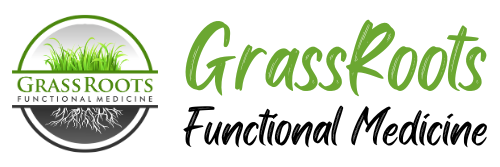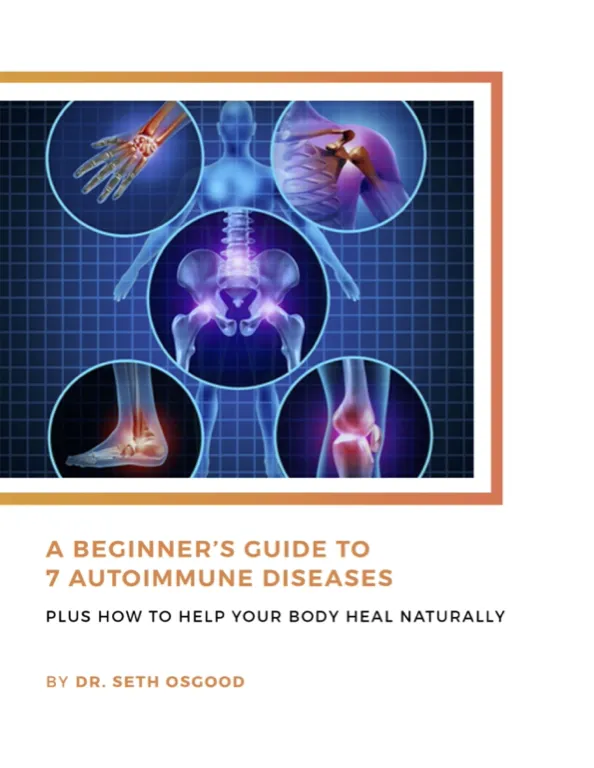This week marks the one-year anniversary since COVID lockdowns began in the United States. While there will be many speeches and articles memorializing the lives lost to the pandemic (and rightly so), I want to shine a light on a lesser-known health crisis brought on by the months of isolation and uncertainty.
The number of people seeking help for anxiety has skyrocketed in the last year and they are finding very few solutions.
Conventional medicine labels anxiety as a neurotransmitter imbalance and relies on pharmaceutical drugs to dampen the symptoms. Don’t get me wrong, prescription medications CAN be a helpful and even necessary tool in periods of overwhelming anxiety.
But we have so many more tools at our disposal than just medications!
In functional medicine, we recognize that anxiety is often the proverbial “tip of the iceberg”. It’s the clear and present warning that something is going on below the surface that needs our attention. Our current circumstances may have been the breaking point, but the anxiety itself is a manifestation of underlying issues. These issues can be corrected in order to make anxiety more manageable or even eliminate it!
If you are one of the many people struggling right now, I want you to know that there are other options and tools available.
Here’s what a functional medicine approach to anxiety can look like.
Phase I: Investigate the Root Causes
As always with a functional approach, our goal is to uncover WHY your symptoms are occurring so we can address the root cause. Here are a few of the most common I see in my practice.
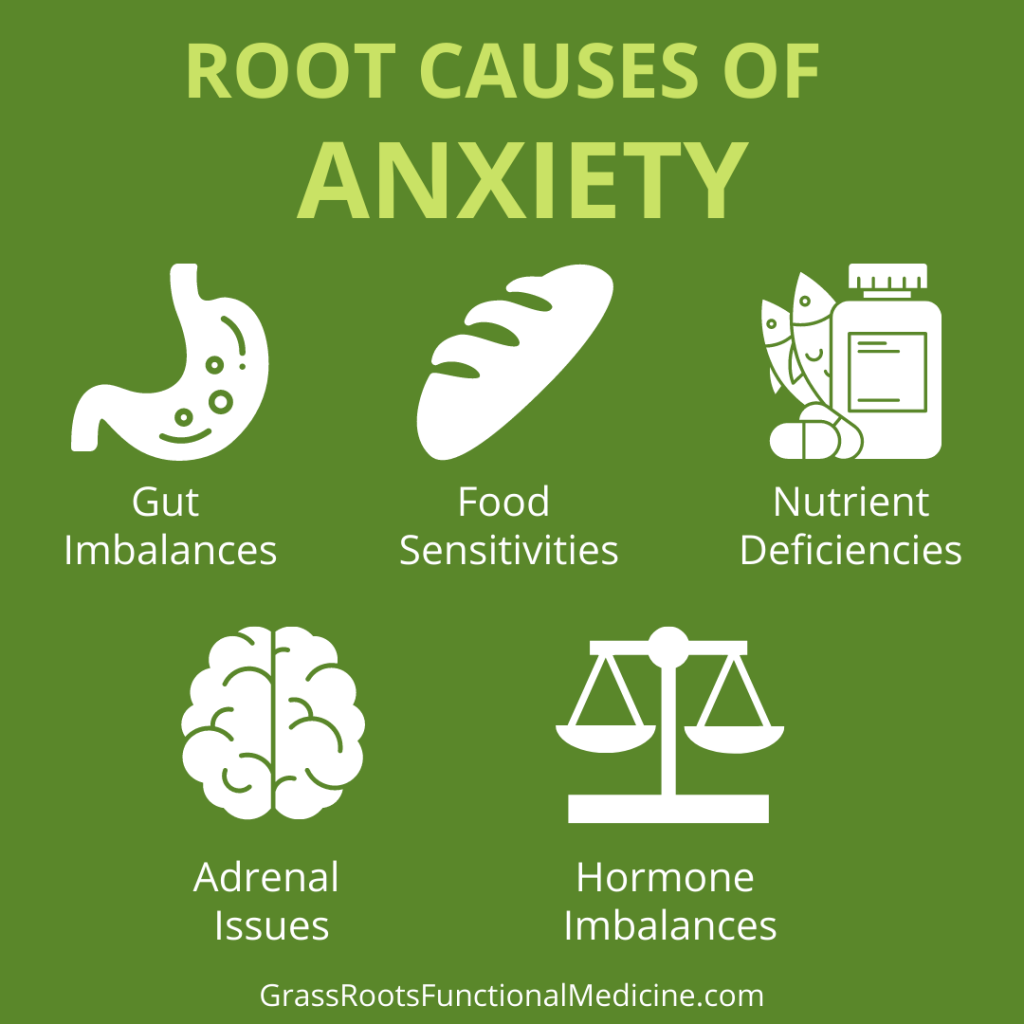
Gut Imbalances
If you’ve followed me for a while, you’ve heard me talk a lot about the gut-brain connection. It’s so important for mood and cognitive function! A huge number of your neurotransmitters are produced in your gut, including 90% of your serotonin, and it’s where you absorb the nutrients needed for brain function.
Gut imbalances disrupt your microbiome, trigger inflammation, and can lead to nutrient deficiencies, wreaking havoc on your mood and overall health. SIBO, Candida, parasites, and leaky gut can all contribute to anxiety, along with deficiencies in stomach acid (HCL), bile acids, and digestive enzymes.
Food Sensitivities
Food intolerances are a major contributor to brain inflammation. They occur when your immune system mounts an inflammatory response to certain foods. Unlike food allergies, the reactions can be delayed by up to 72 hours and the symptoms are less severe, making them harder to identify.
Nutrient Deficiencies
There are many nutrients involved in balancing your mood, such as B vitamins, magnesium, vitamin D, and zinc. If you’re not eating enough of them, or your digestive system is disrupted and you can’t absorb them, anxiety can develop.
Adrenal Issues
Not surprisingly, chronic stress plays a major role in anxiety. Stress alters the production of cortisol, DHEA, and pregnenolone, which causes changes in neurotransmitter production. This includes mental and emotional stress, as well as physical stress from inflammation, lack of sleep, blood sugar fluctuations, infections, and chronic disease.
Hormone Imbalances
Anxiety and depression are two hallmark symptoms of estrogen dominance (where your estrogen levels are too high relative to your other sex hormones). The most common scenario I see is women who experience a surge of anxiety or depression around the time of their period and then are “back to normal” once their cycle restarts.
Recommended Lab Tests
The exact tests recommended for you will depend on what red flags pop up in your symptoms and history. In our Adaptation Program, for instance, patients complete a comprehensive intake form, including a health timeline, symptom questionnaire, and food diary before coming to see us. We then spend 80 minutes in the initial visit digging deeper into this information and uncovering clues to guide the testing process.
A few of the most common tests I use for patients with anxiety include:
- Comprehensive Stool Test with Parasitology – This test is far more in-depth than a conventional stool test, and catches many things traditional tests miss. I like the GI MAP™ profile because it identifies bacterial, fungal, and viral pathogens, parasitic protozoa and worms, and evaluates digestive function and inflammation levels.
- Food Sensitivity Testing – I recommend this along side an elimination diet (more on this below) if you’re struggling with many food intolerances and need help pinpointing your trigger foods. It’s also a great tool for children who may have a harder time with elimination diets. We offer at-home food sensitivity testing for those interested.
- Nutrition Profile – A quality nutrition profile will look at vitamins, minerals and antioxidants, and indicate any GI issues inhibiting nutrient absorption. That way, you know exactly which nutrients to target with supplementation and can ensure you get the most from them and your diet.
- DUTCH Hormone Testing – In my experience, this is the gold standard for hormone testing. It measures progesterone, estrogens, androgens, cortisol, cortisone, and DHEA, along with nutritional markers related to hormones and neurotransmitters.
Phase II: Ease Symptoms
Next, it’s time to implement baseline strategies to ease your symptoms. You can think of these as a bridge to help you start feeling better until you can make targeted changes based on your lab results in phase III.
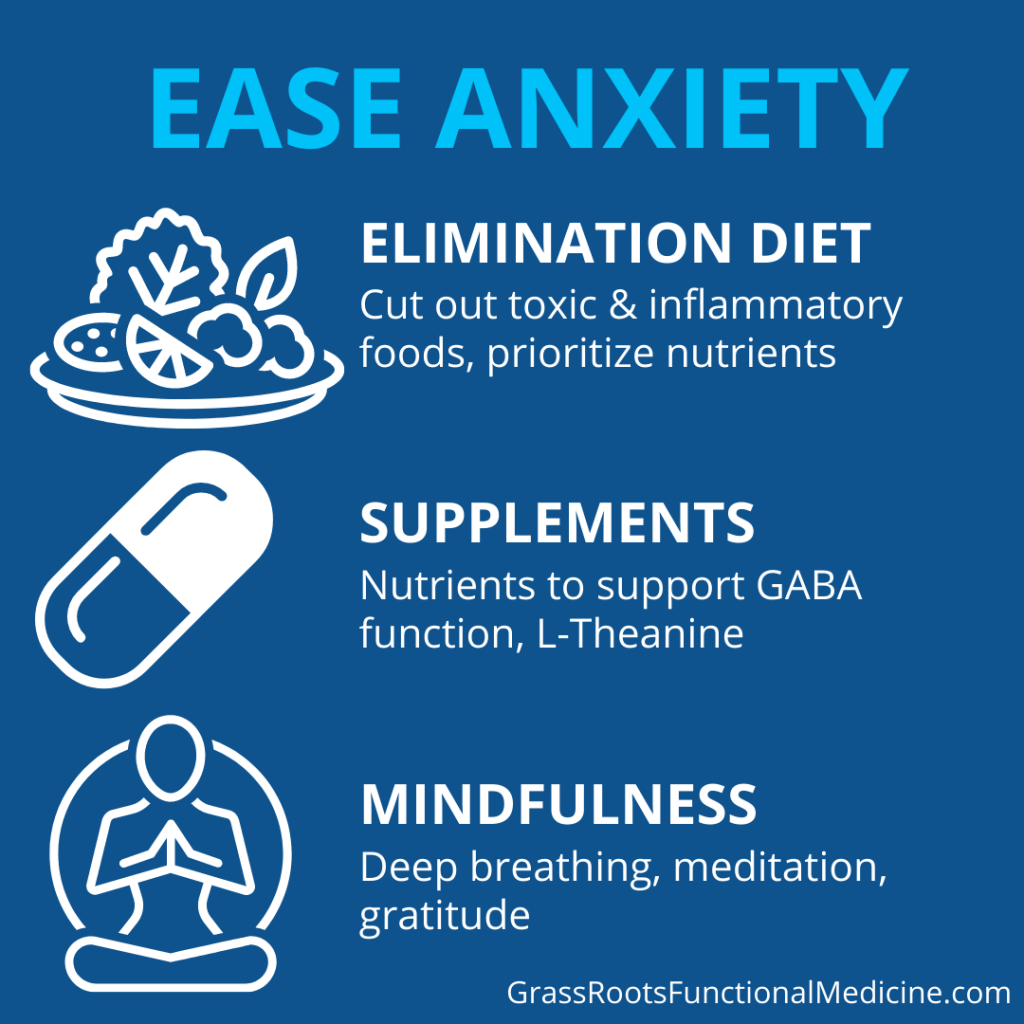
Begin an Elimination Diet
Cutting out toxic and inflammatory foods gives your body a break and time to reset. Focus on eating nutrient-dense whole foods while eliminating alcohol, caffeine, sugar, and processed foods, along with top inflammatory foods like gluten, dairy, soy, eggs, and nightshades.
Many patients see a huge improvement in their symptoms from this step alone! After 4 weeks you can add the potential trigger foods back in one at a time to see how you tolerate them.
Start Supplements to Relieve Anxiety
These can be helpful tools either in place of or alongside anti-anxiety pharmaceuticals.
- GABA STM – GABA is a neurotransmitter that reduces fear and promotes relaxation. This supplement contains 9 nutrients, amino acids, and co-factors that support natural GABA function, most notably lithium orotate. It’s great for general anxiety and can be taken multiple times throughout the day to keep you feeling even-keeled.
- InstaCalm – For periods of acute anxiety or highly stressful events, this highly pure form of L-theanine can be a lifesaver. It’s an amino acid found in green tea and provides a calming and relaxing effect without any drowsiness.
Practice Mindfulness
Activities that slow your racing mind and focus you in the present can be hugely helpful for releasing anxiety. Deep breathing exercises, a quick meditation, or gratitude journaling are all simple tools you can work into your daily routine or rely on when anxiety flares.
Phase III: Restore Balance
The third and final phase is when the real magic happens! This is when you and your functional medicine provider review your lab work and develop a personalized protocol to correct imbalances and replenish the missing factors needed for healing.
This is tailored specifically to what you need as an individual, so there is no one-size-fits-all treatment. However, the general framework looks like this:
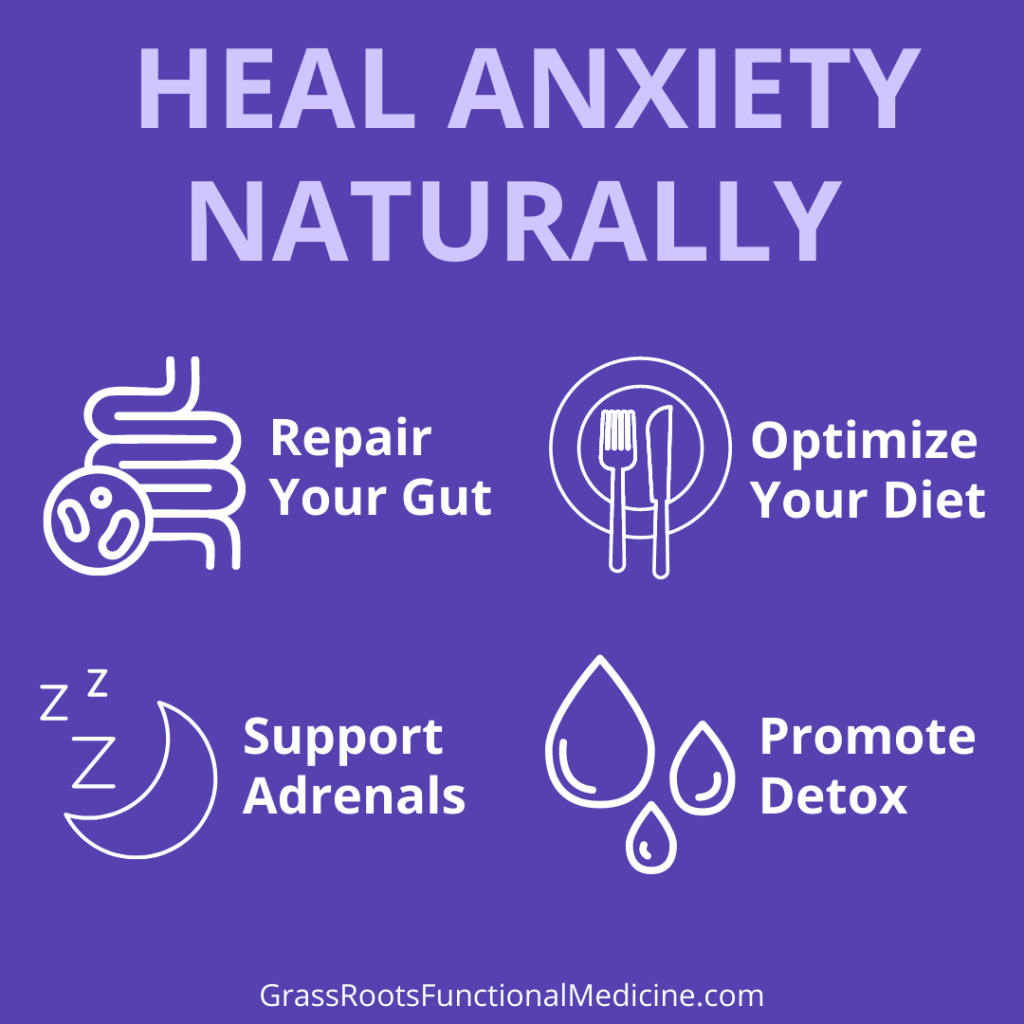
Repair Your Gut
Treat any infections uncovered by your stool test using antimicrobial herbs or medications, support your microbiome with probiotics, and replenish the ingredients needed for digestion, including HCL and digestive enzymes.
Optimize Your Diet
Based on your elimination diet and/or food sensitivity testing, you can remove your personal trigger foods and prioritize the nutrients you’re low in. This may include supplementing with a multivitamin, B vitamins, a magnesium supplement that crosses the blood-brain barrier, or other targeted nutraceuticals.
Support Your Adrenals
Work to remove mental stressors from your life as much as possible (toxic relationships, unnecessary obligations, unrealistic expectations) and relieve stress through massage therapy, exercise, prayer, and spending time in nature or with family. Emphasize quality sleep, exposure to natural light, and limiting screens before bed to support your circadian rhythm.
Balance Hormones
In some cases, bioidentical hormone therapy may be used, but many patients are able to rebalance hormones by supporting detoxification. To help excess estrogen exit your body, make sure you’re peeing, pooping, and sweating. Drink plenty of filtered water, eat a diet rich in fiber and antioxidants, and use an infrared sauna.
Remember, your mental health plays a big role in your physical health – it’s not something to overlook! In fact, addressing anxiety can be the gateway to overcoming other challenges. Many patients seek out a functional approach to deal with crippling anxiety and see so many of their other symptoms resolve along the way.
If you’re overwhelmed by anxiety and looking for a longer-term solution that gets to the root cause, I highly encourage you to seek out a functional medicine approach, whether by joining our Adaptation Program or finding a provider in your area.
About the Author: Dr. Seth Osgood is a Doctor of Nursing Practice, Board Certified Family Nurse Practitioner and Institute of Functional Medicine (IFM) Certified Practitioner. Dr. Osgood received his post-graduate training in Functional Medicine through the IFM and from working with Dr. Amy Myers. He has helped people from around the world improve their health utilizing a Functional Medicine approach.
Want to work with Dr. Osgood and the GrassRoots team? Become a patient in our West Lebanon, New Hampshire Functional Medicine clinic, our Burlington, Vermont Functional Medicine clinic, or our Austin, Texas Functional Medicine clinic!
